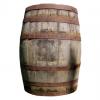Hi there,
I recently started writing a small game engine, mainly for educational purpose not intending to sell it, but i do intend to use it (hopefully). I have got to a point where it has enough features to make a basic game, but i can't really think of any way to make a game with it without tying game-specific code to the engine.
I would like to have 3 projects setup like this:
· Engine [Lib/DLL]
· Game [EXE]
· Editor [EXE]
Im not quite sure how to achieve this or if this is even the correct approach. I'm also not entirely sure, lets say this is the correct approach, whether or not i compile the engine into a static library or a dynamic library. I have read a little about static libraries vs DLLs but i'm still not sure which one would actually better as they both have their disadvantages.
The game world in this engine is composed of actors(Game Objects) which can have components attached to them, just like unity and UE4 (more so like UE4) and i would like to be able to easily define actor and component types in the game project.
Also please note i am hoping to make this cross-platform (the editor side of things at least, so i can edit the game on linux).







